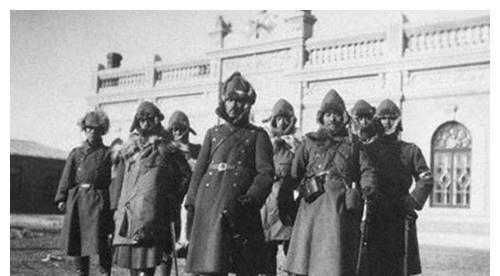More than 100 years ago, Japan committed a number of heinous crimes against our country, although with the development of the times, the two countries have established diplomatic relations and developed good-neighborly and friendly relations between the two countries. But the past history is indelible, and our crimes we have not forgotten for a single day.
Due to the corruption and incompetence of the Qing government at that time, in the face of Japan's advanced weapons resources, the Sacrifice of the Chinese side was particularly serious, including an army known as the "Flower of the Imperial Army", which had the strongest combat effectiveness, the best equipment, and even did not need to listen to the Japanese prime minister later.

The Kwantung Army, an important part of the old Japanese Army. In February 1904, the Russo-Japanese War broke out between Japan and Russia for the northeast region of our country. After the war, they ruthlessly divided up the land in the northeast region of our country, of which "the railways of Changchun and Lushun and all branch lines were unconditionally ceded to Japan."
In May 1905, in order to meet the needs of the Japanese army, they arbitrarily renamed the Liaodong Peninsula of China "Kwantung Prefecture", abolished the Kwantung Prefecture Civil Affairs Bureau, and established their Kwantung Governor's Palace in Liaoyang.
In February 1906, they were even more advanced, establishing 6 independent garrisons in northeast China, all of which were their men along the railway line, at that time they claimed to have 1 million people, and the Japanese side also attached great importance to this Kwantung Army, after which they were directly under the command of the Japanese emperor and had a certain degree of independence.
In 1917, these Japanese troops stationed in the northeast for many years, officially known as the "Kwantung Army", gradually became stronger, and began to obey only the chief of staff, even if the emperor came, it was not easy to make it. At this time, they were also known as the "Flowers of the Imperial Army", because at their peak, they had 31 infantry divisions, 11 infantry and tank brigades, 1 death squad brigade and 2 air forces, totaling about 1.2 million people.
Over the decades, they continued to expand their army, and by 1945, the reorganized Kwantung Army had 8 divisions, 7 mixed brigades, 1 tank regiment and 5 artillery companies, and finally reached 700,000, and the strength of the Kwantung Army reached 24 divisions.
However, these are only superficial inflated data, in 1945 their weapons and equipment and combat effectiveness are only the previous 8 divisions, and even the elderly and children are counted, it is conceivable that the battle will be a fiasco.
So on August 8, 1945, 1.5 million Soviet Red Army targeted them, and the so-called "Flower of the Imperial Army" was vulnerable. In the early morning of the 9th, the Soviet army attacked them from 3 directions, and just after dawn, the mighty Soviet army set foot on the territory of northeast China and beat them on the battlefield of 5,000 kilometers.
On the 10th, the Japanese issued an order to the Kwantung Army to abandon Manchuria. As a result, the Kwantung Army, which had long thought itself to be the "trump card" army of the Japanese army, did not listen at all, refused to surrender, and was dying. On August 15, Emperor Hirohito of Japan publicly announced his surrender, but the Kwantung Army still did not listen and did not want to cease the war.
As the number of personnel continued to decrease and die, the last commander-in-chief of the Kwantung Army, Yamada Otsuzo, was forced to submit a request to the Soviets for armistice negotiations. On August 19, the two sides met, and Yamada announced that he and all his subordinates had become Soviet prisoners.
In this battle, the Kwantung Army lost about 677,000 people, of which 83,000 were killed and 594,000 surrendered. In contrast, the Soviets suffered only 32,000 casualties, and the so-called "ace" army was vulnerable.
Therefore, the biggest difference between the Kwantung Army and the Japanese army is the status and ability of the two sides, the ability is high, so high that it can not listen to the emperor's words; insufficient ability can only be regarded as ordinary Japanese troops.